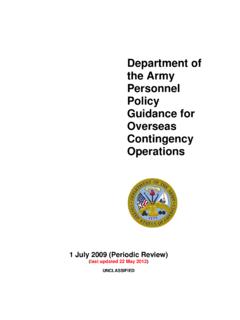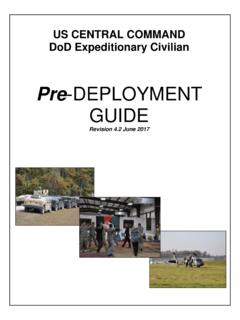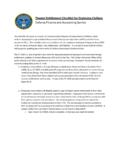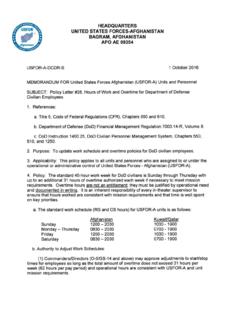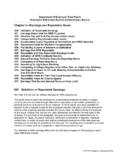Transcription of Compensation - cpms.osd.mil
1 Compensation Pay Employees in a TDY status will continue to receive their basic pay and locality pay, special rate supplement or local market supplement (whichever is applicable) for their permanent duty station. Employees are required to participate in the DoD Direct Deposit/Electronic Fund Transfer of Pay (DD/EFT) program. Salaries are not tax free and salary deductions do not change while on deployment. Danger Pay and Post (Hardship) Differential Pay are typically paid biweekly with regular salary. Payments are computed as a percentage of an employee s basic pay excluding allowances, differentials, or other additional Compensation . Exception: Locality pay, special rate supplements, and local market supplements are considered basic pay in computing danger pay and post differentials for employees in a TDY status. 2 International/Expeditionary Policy Office (IEPO) Defense Civilian Personnel Advisory Services Overseas Allowances Cost of Living Allowances (COLA) The cost-of-living allowances are those allowances that are designed to reimburse employees for certain excess costs that they incur as a result of their employment overseas.
2 This group includes the Post Allowance (more commonly referred to as the COLA), Foreign Transfer Allowance, Home Service Transfer Allowance, Separate Maintenance Allowance, Education Allowance, and Educational Travel. Cost-of-living allowances are not considered a part of taxable income. Note: With the exception of a Separate Maintenance Allowance (SMA), only employees who are deployed to Iraq, Afghanistan, and Pakistan from an overseas post will be eligible for some of the allowances listed below. Post Allowance: Current Rates: Post (Cost of Living) Allowance (DSSR 220) Taxable Status: Non-Taxable Reference(s): Department of State Standardized Regulations (DSSR) 220 Post Allowance is a cost-of-living allowance granted to full-time employees officially stationed in a foreign area where the cost of living, exclusive of quarters costs, is substantially higher than in Washington, Employees deployed on TDY will continue to receive their Post Allowance for 30 days after leaving their country of assignment.
3 On the 31st day, it will terminate. o Exception: Employees whose family members remain in country of assignment will still receive the post allowance minus the employee s portion. Employees on TCS from an overseas post will lose their Post Allowance the day they commence travel to their new duty station. The post allowance rate is determined by the classification of the employee s post, his/her salary, family size, and the applicable annual rate prescribed in Section of the DSSR. Living Quarters Allowance (LQA): Current Rates: Annual Living Quarters Allowance In Dollars (DSSR 130) Taxable Status: Non-Taxable References: DSSR (c), 5 5923, DoD (Subchapter 1250) A quarters allowance granted by the employing activity, as a recruitment incentive, to reimburse eligible employees for the annual cost of suitable and adequate living quarters for the employee and his/her family at a foreign post, whenever government housing is not provided.
4 3 International/Expeditionary Policy Office (IEPO) Defense Civilian Personnel Advisory Services Employees assigned to contingency locations via TDY are not eligible for LQA. However, Employees on TDY from an overseas duty station who received LQA prior to their deployment will continue to receive the LQA for their post of assignment, providing the employee maintains and continues to pay for his/her quarters at the post. LQA rates are established by the Department of State. A maximum LQA is established for each post abroad based on the employee s o Grade o Quarters group o Family size TCS employees may be eligible to receive a Separate Maintenance Allowance instead of LQA while deployed. LQA payment is paid biweekly. The LQA Formula is: o Annual LQA Rate / # of days in calendar year = XX * 14 (biweekly rate) Separate Maintenance Allowance (SMA): Current Rates: Separate Maintenance Allowance (DSSR 260) Taxable Status: Non-Taxable References: DSSR 260 Allowance provides employees additional pay to cover expense of maintaining family members elsewhere than at the employee's foreign post of assignment.
5 Employees deployed to contingency locations as a change of station assignment may be eligible for a SMA. Employees on TDY orders are not eligible for SMA. There are three types of SMA: Involuntary (ISMA), Voluntary (VSMA), and Transitional (TSMA): ISMA may be granted when family members are prohibited from residing at the foreign post. VSMA may be granted when family members may go to a foreign post but elect not to for personal reasons. TSMA may be granted to an employee whose family members temporarily occupy commercial quarters following the termination of an evacuation or in connection with an unaccompanied assignment. If family members are not allowed to accompany an employee to contingency locations, SMA is considered involuntary. Involuntary separate maintenance allowance" (ISMA) may be granted because of dangerous, notably unhealthful, or excessively adverse living conditions at the 4 International/Expeditionary Policy Office (IEPO) Defense Civilian Personnel Advisory Services employee's post of assignment in a foreign area, or for the convenience of the Government o Dependent children, including sisters and brothers, must be under age 21 or incapable of self-support, unless they are attending secondary school ( , grades 9-12).
6 Circumstances not warranting SMA are listed in DSSR 263. ISMA is effective the first day of separation, provided that Form SF-1190 has been submitted. TCS employees may be eligible for SMA o Exception: Employee is receiving LQA from home station TDY is a duty at one or more locations away from the Permanent Duty Station (PDS). The PDS has not changed and the employee is not eligible for SMA. *Important Note: If TCS employee receives SMA for a dependent child under the age of 18 and the child did not move to post with employee, then child is not eligible for an educational travel allowance. NonForeign Area COLA: Current Rates: Non Foreign Per Diem Rates Taxable Status: Non-Taxable References: OPM Non Foreign Areas The National Defense Authorization Act (NDAA) for Fiscal Year 2010 (Public Law 111-84, October 28, 2009) transitions the nonforeign area cost-of-living allowance (COLA) authorized under 5 5941(a)(1) to locality pay authorized under 5 5304 in the nonforeign areas as listed in 5 CFR Per Diem: Taxable Status: Non-Taxable References: Per Diem, JTR, par.
7 4050-A1 Per Diem is designed to offset lodging and meals and incidental expenses (M&IE) costs incurred while performing travel, and/or TDY away from the PDS. The Department of State Office of Allowances establishes per diem rates for foreign areas o Foreign Area Per Diem Rates The General Services Administration establishes per diem rates in the continental United States (CONUS) o CONUS Per Diem Rates 5 International/Expeditionary Policy Office (IEPO) Defense Civilian Personnel Advisory Services The Department of Defense establishes per diem rates for non-foreign locations outside of the continental United States, such as Alaska, Hawaii, or Guam o Non Foreign Area Per Diem Rates Per Diem is typically paid to an employee when they return from their deployment upon settlement of a travel voucher. Danger Pay Allowance Danger Pay Allowance provides civilian employees additional Compensation of up to 35 percent above basic pay for service in foreign locations where conditions of civil insurrection, civil war, terrorism or wartime conditions exist.
8 These conditions do not include acts characterized chiefly as economic crime. Danger Pay: Current Rates: Danger Pay Allowance (DSSR 650) Taxable Status: Taxable References: DSSR 650, 5 5928 Danger pay is calculated as a percentage of basic pay and is paid only for regular duty hours. A locality rate, special rate supplement, or local market supplement is considered to be an employee s rate of basic pay for the purpose of computing danger pay allowances for employees on TDY in contingency locations. Neither overtime pay and other, premium pay nor other allowances are factored into the calculation of danger pay. Employees on detail at a danger pay post may be granted danger pay allowance at the prescribed rate for all days of detail at such post. o Exception: Days of absence from the post in a post or area not designated for the danger pay allowance.
9 Detail is defined as at least four (4) cumulative hours in one day and is considered an entire day. Danger pay allowance commences on the date of designation by the Secretary of State for employees present at the post on assignment or detail, and on the date of arrival at post for subsequently assigned or detailed employees or for employees returning to post after temporary absence. The danger pay allowance terminates as of the close of business on the day the designation is removed by the Secretary of State, or the day the employee departs the post for any reason for a post or country/area not designated for the danger pay allowance. 6 International/Expeditionary Policy Office (IEPO) Defense Civilian Personnel Advisory Services If an employee leaves the country for which Danger Pay is authorized, an updated SF- 1190 indicating the period of time outside the specific country must be submitted.
10 Danger Pay will resume once the employee returns and any discrepancies with the dates on the SF-1190 will be rectified. Due to periodic review, Danger Pay is subject to change WITHOUT notice. Formula Example: 50 (Hourly Rate) x .35 (35% Danger Pay Rate) = $ $ x 80 (biweekly hours) =$1400 (additional Compensation for danger pay) Post (Hardship) Differential Post Differential provides additional Compensation to employees for service in foreign areas where environmental living conditions differ substantially from those in the continental United States. Post (Hardship) Differential (TDY): Current Rates: Post (Hardship) Differential Rates Taxable Status: Taxable References: DSSR 500 A post differential is calculated as a percentage of basic pay and is paid only for regular duty hours. A locality rate, special rate supplement, or local market supplement is considered to be an employee s rate of basic pay for the purpose of computing post differentials for employees on TDY in contingency locations.
